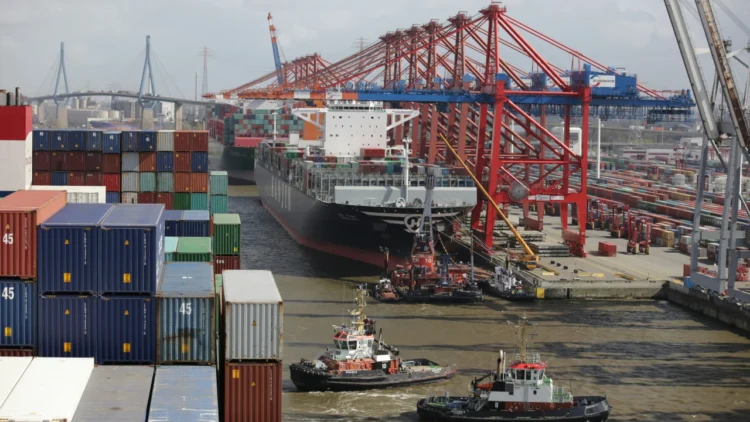The Latest Trends In Supply Chain Logistics
The concept of supply chain logistics is rapidly evolving, influenced by an ever-changing global landscape and new paradigms driven by technology and sustainability.
by a.huynh | In: Inventory |
In an era of rapid digital transformation and a heightened focus on environmental impact, companies are re-evaluating their logistics operations to enhance efficiency, reduce risk, and foster greater transparency.
This comprehensive exploration of the latest trends in supply chain logistics is designed to inform and spark strategic thinking for businesses and professionals operating within this dynamic field. As we examine these emergent shifts, we’ll unpack the opportunities they present and how they have been poised to shape the supply chain landscape for years.
Importance of Staying Updated on Supply Chain Trends
Businesses that ignore the dynamic nature of supply chain logistics do so at their peril. Staying abreast of the latest trends is not merely an exercise in awareness but a strategic imperative. In today’s global economy, agility and responsiveness are non-negotiable, and these can only be achieved by understanding and integrating the latest tools and practices into supply chain operations.
Firms that harness the power of technological advancements and sustainability initiatives can gain a significant competitive edge. Likewise, those who develop robust risk management and resilience strategies are better equipped to weather unforeseen disruptions, which have become increasingly common in our interconnected world. By making data-driven decisions and fostering supply chain transparency, companies can enhance customer and stakeholder trust, a significant differentiator in modern business environments.
Technology Integration in Supply Chain Logistics
IoT’s Role in Enhancing Visibility
The Internet of Things (IoT) continues to revolutionize supply chain logistics by providing real-time tracking and visibility. Sensors and connected devices across transportation and storage facilities enable companies to monitor the condition and location of goods throughout the supply chain. This heightened visibility facilitates more accurate inventory tracking and allows proactive management of supply chain activities.
AI’s Impact on Operations
Artificial Intelligence (AI) is being deployed to optimise logistics operations through predictive analytics and autonomous decision-making. AI-driven software aids in predictive equipment maintenance, efficient shipment routing, and managing complex supply chain networks. Furthermore, AI enhances procurement processes, improving supplier selection and cost management strategies.
Blockchain for Secure and Efficient Transactions
Blockchain technology finds its place in logistics by establishing secure, transparent, and traceable supply chain networks. Smart contracts enable self-executing agreements with the potential to streamline transactions, while the immutable nature of blockchain records can ensure the authenticity of goods throughout their transportation cycle.
Sustainability in Supply Chain Logistics: The Green Movement
Green Logistics Sparks Innovation
The push for sustainable business practices has led to the concept of ‘green logistics,’ a movement that seeks to minimise the environmental impact of supply chain operations. Companies are exploring alternative energy sources for transportation, optimising routes to reduce emissions, and redesigning packaging to be more eco-friendly.
Eco-Friendly Packaging Innovations
With the rise of e-commerce and global shipping, the packaging industry has shifted towards eco-friendly solutions. Biodegradable materials, packaging designs that minimise waste, and reusable or returnable packaging are gaining traction, reducing the carbon footprint associated with supply chain logistics.
Resilience and Risk Management in Supply Chain Operations
Navigating Supply Chain Disruptions
Unforeseen disruptions, such as natural disasters and geopolitical events, can profoundly impact supply chain operations. Resilience strategies focus on building flexibility into the supply chain, with the ability to adapt to changes and recover from disruptions quickly.
The Role of Technology in Risk Mitigation
Advanced technology plays a significant role in identifying and mitigating risks within the supply chain. Predictive analytics can anticipate potential disruptions, allowing companies to take pre-emptive action. Additionally, technologies like 3D printing and local sourcing can provide alternative production and sourcing channels, reducing the dependence on global supply chain networks.
Data-Driven Decision Making: The Power of Insights
Predictive Analytics for Anticipating Demand
Supply chains are becoming increasingly data-driven, with predictive analytics tools providing unprecedented insights into customer demand. By analysing historical data and market trends, businesses can make more informed decisions regarding inventory levels, production schedules, and transportation methods.
Real-Time Monitoring Enhances Operational Efficiency
Real-time data from IoT devices allows supply chain managers to make immediate adjustments, optimising the flow of goods. This level of responsiveness can lead to reduced lead times, lower inventory costs, and improved customer service levels.
Supply Chain Transparency as a Business Driver
Ethical Sourcing and Consumer Demands
Today’s consumers are more informed and socially conscious, driving the need for transparency in supply chain operations. Companies are expected to trace the origins of their products and ensure ethical labour and sourcing practices. Supply chain transparency meets consumer demands and fosters trust and brand loyalty.
The Impact of Traceability
Tracking products from source to consumption is a powerful tool in combating counterfeiting and ensuring quality. Technologies such as RFID and barcode scanning make this level of transparency achievable, with benefits extending to inventory management and fraud prevention.
Contact Us
At Tooling Intelligence, we offer a comprehensive range of point-of-use vending solutions for various industrial applications. Call us on 01926 484 511 or you can send us an email here.





